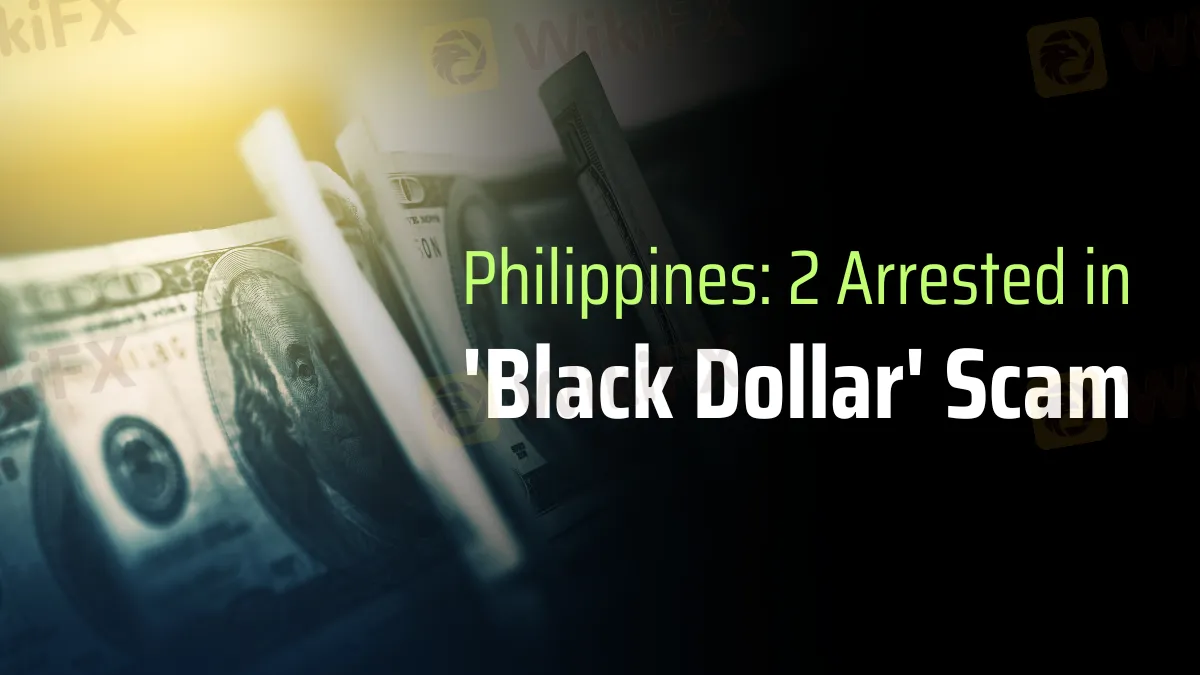简体中文
繁體中文
English
Pусский
日本語
ภาษาไทย
Tiếng Việt
Bahasa Indonesia
Español
हिन्दी
Filippiiniläinen
Français
Deutsch
Português
Türkçe
한국어
العربية
Philippines: 2 Arrested in 'Black Dollar' Scam
Abstract:Two suspected scammers were arrested in the Philippines for a 'black dollar' scam, deceiving victims into buying chemicals to clean and convert counterfeit currency.

The National Bureau of Investigation (NBI) apprehended two suspected fraudsters in accordance with the Revised Penal Code and the Cybercrime Prevention Act. The accused reportedly duped their victims into purchasing chemicals to “clean and convert” counterfeit cash into US dollars.
The fraud included persuading victims that certain chemicals, when appropriately combined, could change counterfeit cash into genuine US dollars. So-called “black dollar” fraudsters in the Philippines have utilized this intricate deception to deceive their naïve victims.
The NBI's Cybercrime Division (NBI-CCD) conducted a sting operation that resulted in the arrest of two African males participating in the “black dollar” scheme. The investigation began on Wednesday in response to a report from a victim who had fallen victim to the fraud.
Arrest Details
The operation began when a complaint was made against a man masquerading as “Dr. Paul.” NBI agents captured Khan Fonkam and his brother Awa Fonkam, both Cameroonians, at Bonifacio Global City (BGC), Taguig, following Director Jaime Santiago's orders.

The Scam Emerges
According to the lawsuit, “Dr. Paul” solicited the victim about investing in the Philippines. They met at a hotel in Makati City on July 5, 2024, and the victim gave them Php400,000 (about $6,844).
“Dr. Paul” then carried out a bogus “decoding process,” which included powdering the money and wrapping counterfeit notes in foil before immersing them in boiling water. He advised the victim not to open the package for 24 hours to enable the chemicals to “work.”
Suspicion and Discovery by the Victim
The victim opened the gift at home, suspicious, to see just black paper inside. When he sought to call “Dr. Paul” for an explanation, he was informed that they couldn't meet and that Php50,000 (about $855) was required for more drugs.
Further inquiry showed that “Dr. Paul” was Khan Fonkam, whom the NBI-CCD had previously captured on May 31, 2024. This finding led the victim to notify police about the deception.
Charges Filed
The accused are currently facing charges at Taguig City Prosecutor's Office. They are accused of estafa (Article 315 of the Revised Penal Code) and unlawful possession and use of counterfeit money (Article 168 of the Revised Penal Code). These accusations are related to Section 6 of Republic Act No. 10175, generally known as the Cybercrime Prevention Act of 2012.
The NBI's quick response in apprehending these fraudsters exemplifies continuous efforts to fight cybercrime and safeguard individuals from deceptive scams. Victims of such scams are advised to report them to authorities so that these misleading tactics might be put a stop to.

Disclaimer:
The views in this article only represent the author's personal views, and do not constitute investment advice on this platform. This platform does not guarantee the accuracy, completeness and timeliness of the information in the article, and will not be liable for any loss caused by the use of or reliance on the information in the article.
Read more

Never Heard of Dynasty Trade? Here's Why You Should Be Worried
Have you heard this name before? No , it’s time you do because staying unaware could cost you. This platform is currently active in the forex trading and has been linked to several suspicious activities. Even if you’ve never dealt with it directly, there’s a chance it could reach out to you through ads, calls, messages, or social media. That’s why it’s important to know the red flags in advance.

Want to Deposit in the EVM Prime Platform? Stop Before You Lose It ALL
Contemplating forex investments in the EVM Prime platform? Think again! We empathize with those who have been bearing losses after losses with EVM Prime. We don't want you to be its next victim. Read this story that has investor complaints about EVM Prime.

WEEKLY SCAM BROKERS LIST IS OUT! Check it now
If you missed this week's fraud brokers list and are finding it difficult to track them one by one — don’t worry! We’ve brought together all the scam brokers you need to avoid, all in one place. Check this list now to stay alert and protect yourself from fraudulent brokers.

Catch the Latest Update on BotBro & Lavish Chaudhary
BotBro, an AI-based trading platform, became popular in India in 2024—but for negative reasons. Its founder, Lavish Chaudhary, who gained a huge following by promoting it heavily on social media. Since then, he has become well-known, but for many controversies. Let’s know the latest update about Botbro & Lavish Chaudhary.
WikiFX Broker
Latest News
WEEKLY SCAM BROKERS LIST IS OUT! Check it now
Apex Trader Funding is an Unregulated Firm | You Must Know the Risks
What WikiFX Found When It Looked Into Aron Markets
Textiles to whisky: U.K.–India 'historic' deal is set to boost bilateral trade by over $34 billion a year
Thailand-Cambodia border clashes: Cambodia's economy has more to lose, analysts say
Puma shares plunge 18% after full-year sales, profit outlook cut on U.S. tariffs
Is Your Forex Strategy Failing? Here’s When to Change
FSMA Warns That Some Firms Operate as Pyramid Schemes
Federal Reserve likely to hold interest rates steady despite pressure from Trump. Here's what that means for your money
Sigma-One Capital Scam? Investors Say They Can’t Withdraw Funds
Currency Calculator


